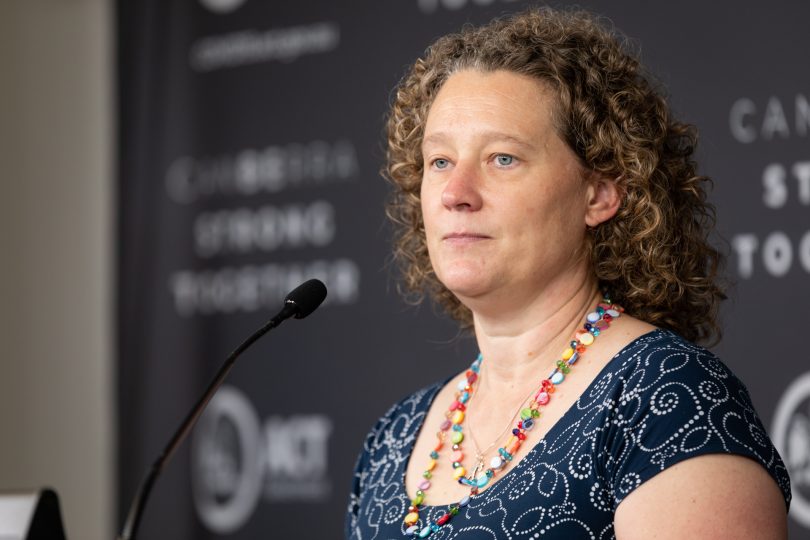
ACT Chief Health Officer Dr Kerryn Coleman has been ultra-cautious. Photo: Michelle Kroll.
The Chief Health Officer has shepherded the ACT successfully through more than a year of the COVID-19 pandemic, but the continued, highly cautionary approach is starting to grate at a time when the ACT is virus-free and the vaccine rollout, hopefully, will be complete by the end of the year.
The continuing limits on live music where there is not fixed front-facing tiered seating not only threaten the viability of small venues, but the ongoing lack of certainty makes planning for larger events such as the National Folk Festival nigh on impossible.
Organisers can apply for exemptions, which in themselves make a mockery of the restrictions. And how major events with long lead times take advantage of that is anyone’s guess.
They also rightly point to the huge full-throated crowd at Canberra Stadium last weekend where any notion of social distancing was abandoned, and the way venues such as cinemas and theatres can operate at 100 per cent capacity.
How is 20,000-plus at the football or the open slather that is our shopping malls any different from crowds at EPIC for the Folk Festival or Summernats or Spilt Milk?
These sections of the entertainment sector feel like they are being treated unfairly and that the health approach is inconsistent and opaque in a city that is one of the safest on the planet.
On the one hand, the decision to pause repatriation flights to Canberra, for the time being, is adding to our sense of security because the only way COVID-19 is likely to rear its ugly head again is from someone from overseas.
But at the same time, the government will allow travellers to self-isolate at home.
With the latest wave in India turning nasty and the virus continuing on its march in other parts of the world, the federal government should rethink accepting more repat flights and its reliance on quarantine hotels in capital cities.
Making this practice even more dangerous are the variants that overseas travellers are likely to bring to our shores.
Allowing travellers to self-isolate at home is a practice fraught with peril.
All it would take is for a quick trip to the shops to reintroduce the virus to the community and kick off the familiar cycles of restrictions and lockdowns.
Then there is the vaccine rollout that is supposed to protect us all. Many of the events that organisers are trying to plan will occur after the great bulk of the population will be vaccinated, yet they are bound by restrictions that don’t take that into account and the paralysing lack of certainty that accompanies it.
To the public, all of these things are adding up to a melange of mixed messages that are leaving it more sceptical and cynical and, in the end, more blasé.
The ACT and Australian health authorities and governments have done an admirable job to keep us safe, but to retain public confidence, there needs to be more caution at the obvious flashpoints, such as overseas infection, and less focus on tying the hands of event organisers and threatening the existence of longstanding cultural institutions and businesses.












